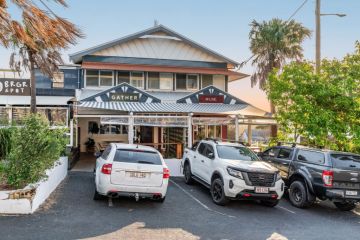Don't believe the hype: When tree and sea changes don't work out
When Kate Johns made a sea change, she expected it to be forever.
Together with her husband and two children, now aged nine and seven, Johns moved to the Mornington Peninsula for a lifestyle change. They could picture it perfectly: her husband would stay home with the kids while she continued to work full time in Melbourne (running her business Sidekick Communications, with the bonus of being part of a regional community and having the beach on their doorstep.
“The first thing I learnt was that it isn’t an hour from Melbourne, as the sales pitch goes,” Johns says. “Commuting every day, in peak hour, was a minimum of an hour and a half each way.”
It didn’t take too long for this to take its toll on family life. “While I didn’t miss the big things like school concerts or birthdays,” Johns says, “I wasn’t ever home to eat dinner with my family.”
“The kids loved their school and my husband had a nice community around him. But for me, having to go backwards and forwards every day meant I was tired all the time, and I was working weekends to recoup the commuting time.”
Having moved in search of a better lifestyle, what they got was just the opposite. The sea change lasted for three years, but ultimately Johns and her family moved back to the eastern Melbourne suburbs.
“We’ve found a beautiful, supportive school, community and friends,” Johns says. “And the kids say that having me at home for dinner is the most important thing; it’s about the little moments.”
While the initial move was made with knowledge of the area – Johns’ family-in-law had a holiday house there, which they spent many weekends at – she’d suggest that others thinking of a sea change do more research. “We based a big life decision on what it’s like to have a little holiday. I suggest to friends that they do the drive in peak hour every day for two weeks, and see how it goes, before making the move.”
- Related: I made a sea-change at 25
- Related: The realities of living in the country
- Related: The new generation of country-dwellers
Miriam Sandkuhler, founder of Property Mavens, agrees that it’s important to explore the reality of a regional move before committing to it.
“You really need to test the waters first, because how you think it will be might not be the reality,” she says. “Spend lots of time there, and try to live as though you’re a member of the community. Connecting with people can give you a sense of whether it will work, and whether you’ll fit in.”
Sandkuhler suggests renting for at least the first 12 months of a country move, just in case it doesn’t work out: “Transitioning to a tree change, and then back, can be really expensive if you’ve bought a property.”
“More importantly, you need to give a lot of thought to why you’re going. What is it you think that environment will do for you, that where you are now doesn’t?”
This “why” was very clear for Brenda Pomponio: moving to north-east Victoria four years ago was a chance to give her children, now aged 11 and nine, the taste of a simpler life. But it always had a time limit on it.
“It was never a forever thing,” she says. “We did our tree change when we were both in our 30s, and we knew that it wasn’t our last stop.”
The end date to their tree change was never set in stone, but has recently come about because of the growth of Pomponio’s husband’s business, which he runs out of Melbourne.
“For a while, we sustained intermittent commuting,” she says. “[My husband] was going back to the city once a fortnight or so [and working from home the rest of the time], and then the business grew more than we anticipated.”
“And as much as we love our country life, we were staring down the barrel of him commuting five days a week.”
Not only would that take a toll on family life, but the Pomponios had embraced country life in its entirety, running a property with livestock and growing their own food. “That would go out the window with all that commuting. You can’t have it all.”
The decision to move back to Melbourne’s north-western suburbs was an easy one for the family, who are still in the process of making the city change.
“We can both more easily pursue our career goals from a capital city,” says Pomponio, who runs her own photography and travel business, Our Family Travels. “Life changes, and we need to reassess it as we go.”
This is a family who sees the temporary nature of their tree change as a positive – after all, they fulfilled that initial “why”. “I’m not disappointed,” Pomponio says; “we’ve given our kids a wonderful experience that they’ll never forget.”
We recommend
We thought you might like
States
Capital Cities
Capital Cities - Rentals
Popular Areas
Allhomes
More







